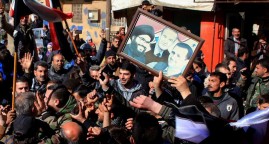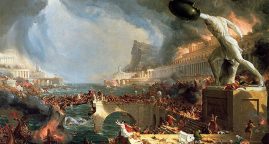Munich Conference on Security: Articles and Videos
WHAT HAPPENED AT THE MUNICH SECURITY CONFERENCE 2017? ANALYSES AND PRESS REPORTS
What topics, news, and developments at the Munich Security Conference 2017 were particularly relevant? A selection of current analyses and press reports.
Article published on the Munich security Conférence website
“Europe is starting to get serious about defence” (The Economist, 23 February): “Mrs Merkel needs a story to persuade sceptical German voters of the wisdom of ramping up military spending from its current level of just 1.2% of GDP. Warm words about preserving security through non-military means offer one. (Wolfgang Ischinger, head of the Munich conference, suggests a 3% target for military, development and humanitarian spending.)”
“When nature is a terrorist” (Editorial Board, Washington Post, 23 February): “Bill Gates the world’s richest man, who has devoted much of his philanthropy to improving global public health, gave a speech the other day at the Munich Security Conference that should have caught everyone’s attention. Mr. Gates insisted that world leaders think differently about public health and national security. They should listen.”
“Profound Uncertainty in Munich: Is the United States Committed to European Security?” (Richard Fontaine, War on the Rocks, 21 February): “This year’s Munich Security Conference once again stood out as the premier international gathering of national security policymakers and thinkers. Anticipation was high in the run-up to Munich, as the conference represented the Trump administration’s first major effort to publicly articulate its Europe policy. […] The participants were left with a pervasive sense that transatlantic relations have entered a new era.”
“The Russification of America” (Roger Cohen, New York Times, 21 February): “Surreal hardly begins to describe the proceedings at this annual gathering, the Davos of foreign policy. This is what happens when the United States is all over the place. Allies get nervous; they don’t know what to believe. “Trump’s uncontrolled communication is unsettling the world,” John Kasich, the Republican governor of Ohio, told me. That is an understatement. The Trump doctrine is chaos.”
“Revamping transatlantic ties at the Munich Security Conference” (Selin Nasi, Hürriyet, 20 February): “The MSC, in this respect, provided some clarity on what to expect from the Trump administration regarding Europe, Ukraine and relations with Russia and China. Will the U.S. remain loyal to its promises? That’s something that cannot be taken for granted.”
“Munich conference: three dangerous superpowers – and we’re stuck in the middle” (Simon Tisdall, Guardian, 19 February): “An uncomfortable phenomenon underlies the numerous existential dilemmas facing world leaders gathered at this weekend’s Munich security conference: it is the scary sight of three superpowers – the US, Russia and China – all behaving badly, all at once.”
“The specter of Trump in Munich” (Anne Applebaum, Washington Post, 19 February): “Diplomatic events are always made smoother by a touch of ambiguity. But at this year’s Munich Security Conference, the annual gathering of the the transatlantic alliance, the ambiguity shaded into something a little weirder. Speaker after speaker called for unity and cohesion in the face of the grave dangers facing the Western alliance. But nobody could quite bring themselves to say the truth out loud: that one of the gravest dangers facing the Western alliance is the president of the United States.”
“MSC Chairman Ischinger: ‘Some degree of clarity has been reestablished'” (Melinda Crane, Deutsche Welle, 19 February): “Wolfgang Ischinger: I’m partially reassured. I think most of the participants here are glad they came. When they arrived three days ago, many of them had a huge number of large question marks. At the end of these three days, I think the conclusion is some of the question marks can now be eliminated, but not all. The dimension of uncertainty is not over yet. We used to have lots of uncertainty about Russian intentions and about how to end the Syrian war. These uncertainties continue. Now, we came to Munich with the uncertainty about the intentions of the Trump administration regarding Russia, NATO, and many other issues. Some of these concerns have been alleviated and that is great. I think we can go home relatively satisfied that some degree of clarity has been reestablished.”
“Awkward first date in Munich” (Matthew Kaminski, Politico, 19 February): “For the Americans and Europeans gathered in the Bavarian capital, it felt like the first date of an arranged coupling, not the natural renewal of a now 70-year-old vow that takes place every time a new president takes office in Washington.”
“A Worried Europe Finds Scant Reassurance on Trump’s Plans” (Steven Erlanger, New York Times, 19 February): “They came from all over — diplomats and generals, policy experts and security officials — seeking clues to President Trump’s ideas and intentions. They left without much reassurance. As the Munich Security Conference, the world’s pre-eminent foreign policy gathering, ended on Sunday, it was notable that even the foreign ministers of China and Iran had taken questions, while Vice President Mike Pence and Defense Secretary Jim Mattis stuck to prepared statements.”
“Iran Mocks Trump Threats, Sets Sights on Gulf Nation Deals” (Jonathan Tirone, Bloomberg, 19 February): “Iran’s foreign minister mocked being ‘put on notice’ in a tweet by U.S. President Donald Trump and said his country is focused on building Persian Gulf alliances. Mohammad Javad Zarif prompted laughter from a crowd of trans-Atlantic military and political officials at a global security conference on Sunday by observing that ‘tweet is now very fashionable’ before answering whether his country was concerned about the possibility of more U.S. sanctions.”
“US senators warn European elections are next hacking targets” (Ewen MacAskill, Guardian, 19 February): “A bipartisan delegation of US senators on Sunday pressed Donald Trump to punish Russia over its alleged interference in the US election race and warned that Moscow’s next targets will be elections in France and Germany. Speaking at the Munich security conference, Republican senator Lindsey Graham, who is a member of the Senate armed services committee, expressed confidence that Congress will pass sanctions against Russia. ‘2017 is going to be the year of kicking Russian ass in Congress,’ he said.”
“Munich Security Conference: Europe’s concerns with Trump government far from over” (Jonathan Marcus, BBC, 18 February): “This year the meeting had added significance since the man in the White House, Donald Trump, is unlike any other president in living memory. His supporters believe he is the man to overturn the “establishment” in Washington and to get things done. His detractors believe he is unfit for high office, his erratic behaviour leading some even to question his mental state.”
“Washington PR Offensive Fails to Quell Europe’s Anxiety Over Trump” (New York Times, 18 February): ” One month into the unusual presidency of Donald Trump, his most senior cabinet members were deployed to Brussels, Bonn and Munich this week to reassure nervous Europeans that everything would be okay. The Europeans heard from Defense Secretary James Mattis that the NATO military alliance was not “obsolete” after all, despite Trump’s repeated suggestions to the contrary. And they were told by Vice President Mike Pence that Russia would be “held accountable” for its actions in Ukraine, despite Trump’s friendly overtures to Russian President Vladimir Putin. But if the aim of the visits was to reassure Europe that the pillars of U.S. foreign policy are fully intact, they fell short of the mark, European diplomats, politicians and analysts gathered in Munich said.”
“China Says Understands South Korean Need for Security, Still Opposes Missiles” (New York Times, 18 February): “Meeting on Saturday on the sidelines of the Munich Security Conference, Wang repeated to South Korea’s Foreign Minister Yun Byung-se China’s opposition to THAAD, China’s Foreign Ministry said in a statement on Sunday. Wang ‘stressed that one country’s security should not be founded on the basis of harming another country’s security’, the ministry paraphrased him as saying.”
“Sergey Lavrov: I hope world chooses post-West order” (Al Jazeera, 18 February): “Russia’s foreign minister has called for an end to an outdated world order dominated by the West, even as US Vice President Mike Pence has pledged his country’s ‘unwavering’ commitment to its transatlantic allies in NATO. Sergey Lavrov’s comments at the Munich Security Conference on Saturday came just hours after Pence promised to stand with Europe to rein in a resurgent Russia and ‘hold Russia accountable’.”
“Germany will take own time to boost defense, Merkel tells Pence” (Janosch Delcker, Politico, 18 February): “Germany will live up to its promise to increase military spending but on its own schedule, German Chancellor Angela Merkel told U.S. Vice President Mike Pence on Saturday morning, speaking right before him at this year’s Munich Security Conference. ‘We will do everything we can in order to fulfil this commitment,’ Merkel said, referring to a ten-year plan to ramp up Germany’s military budget by 2024, which was agreed among NATO member states at a summit in Wales in 2014.”
Read more of the press release…
Post-Truth, Post-West, Post-Order?
Article published on the Munich security Conférence website
Is the world facing disorder and the rise of illiberal actors? Just ahead of the 53rd edition of the Munich Security Conference from February 17-19, the Munich Security Conference Foundation released the third edition of its annual report on key issues in international security (download a PDF version of the report here).
Entitled “Post-Truth, Post-West, Post-Order?”, the Munich Security Report 2017 offers analyses, data, statistics, infographics, and maps on major developments and challenges in international security. The report aims to serve as a companion and conversation starter for the discussions at the Munich Security Conference 2017 and as background reading for participants. At the same time, it is also made available to the interested public. Last year’s report was downloaded more than 25,000 times, with significant press coverage in both German and international media.
Central topics of the new edition include the crises of the international order and of liberal democracy as well as European security and defense policy. In addition, the report assembles information on the jihadist threat, the manipulation and “weaponization” of information, and the security situation in the Pacific and the Middle East.
For this report, the Munich Security Conference, which was recently rated the world’s “Best Think Tank Conference” by the University of Pennsylvania’s “Global Go To Think Tank Index” for the fourth year in a row, cooperated with numerous renowned institutions and think tanks. These include the International Crisis Group, IHS Markit, Chatham House, the International Institute for Strategic Studies, the Nuclear Threat Initiative, the Hertie School of Governance, and McKinsey & Company.
Watch the trailer video
Munich Security Conference’ Official videos
⇒ Statement by Federica Mogherini, Vice President of the European Commission and High Representative for Foreign Affairs and Security Policy, European Union.
⇒ Statement by Angela Merkel, Federal Chancellor, Federal Republic of Germany
⇒ Statement by Sergey Lavrov, Minister of Foreign Affairs, Russian Federation
⇒ Panel Discussion “Syria: Meddling Through”. Staffan de Mistura (Special Envoy of the Secretary General on Syria, United Nations; introduction), Konstantin Kosachev (Chairman of the Committee on Foreign Affairs of the Federation Council, Parliament of the Russian Federation), Brett McGurk (Special Presidential Envoy for the Global Coalition to Counter ISIL, Department of State, United States of America), Anas Al Abde (President, Syria National Coalition), Kenneth Roth (Executive Director, Human Rights Watch), and Roula Khalaf (Deputy Editor, Financial Times; moderator)
⇒ Night Owl Session “The Future of NATO: ‘Obsolete’ or ‘Very Important’?” Michael Fallon (Secretary of State for Defence, United Kingdom of Great Britain and Northern Ireland), Jean-Yves Le Drian (Minister of Defence, French Republic), Jeanine Hennis-Plasschaert (Minister of Defence, Kingdom of the Netherlands), Harjit Singh Sajjan (Minister of National Defence, Canada), Fikri Işık (Minister of National Defence, Republic of Turkey), and Jim Stavridis (Admiral (ret.); former NATO Supreme Allied Commander Europe; Dean of the Fletcher School of Law and Diplomacy, Tufts University; Member of the Advisory Council, Munich Security Conference; moderator)
Related Articles
“Syria will inevitably erupt in both entities”
09/02/2016. For the international reporter of Le Figaro, the unity of Syria no longer exists and neither side can prevail over the other.
Libya’s warring sides reach diplomatic breakthrough in Rome
04/24/2017. Rome has brokered a diplomatic breakthrough in Libya that has the potential to bring the two main warring sides together in a new political agreement after years of division, fighting and economic misery.
The crisis of multilateralism and the future of humanitarian action
11/30/2016. “The crisis consists precisely in the fact that the old is dying and the new cannot be born; in this interregnum a great variety of morbid symptoms appear.’






